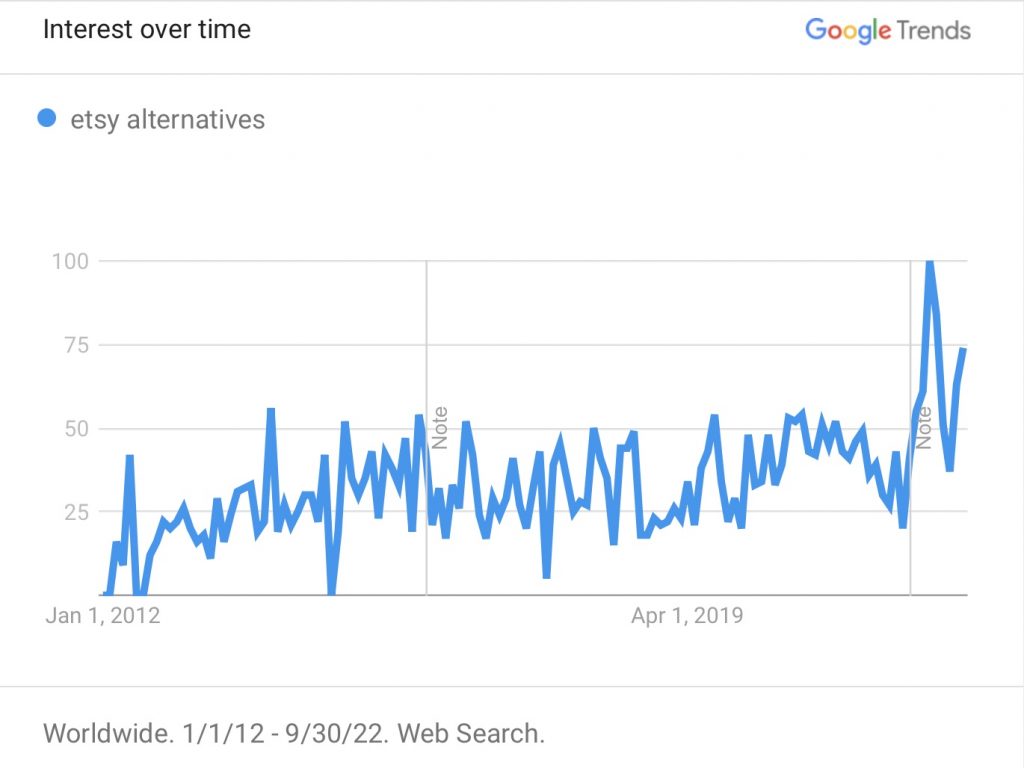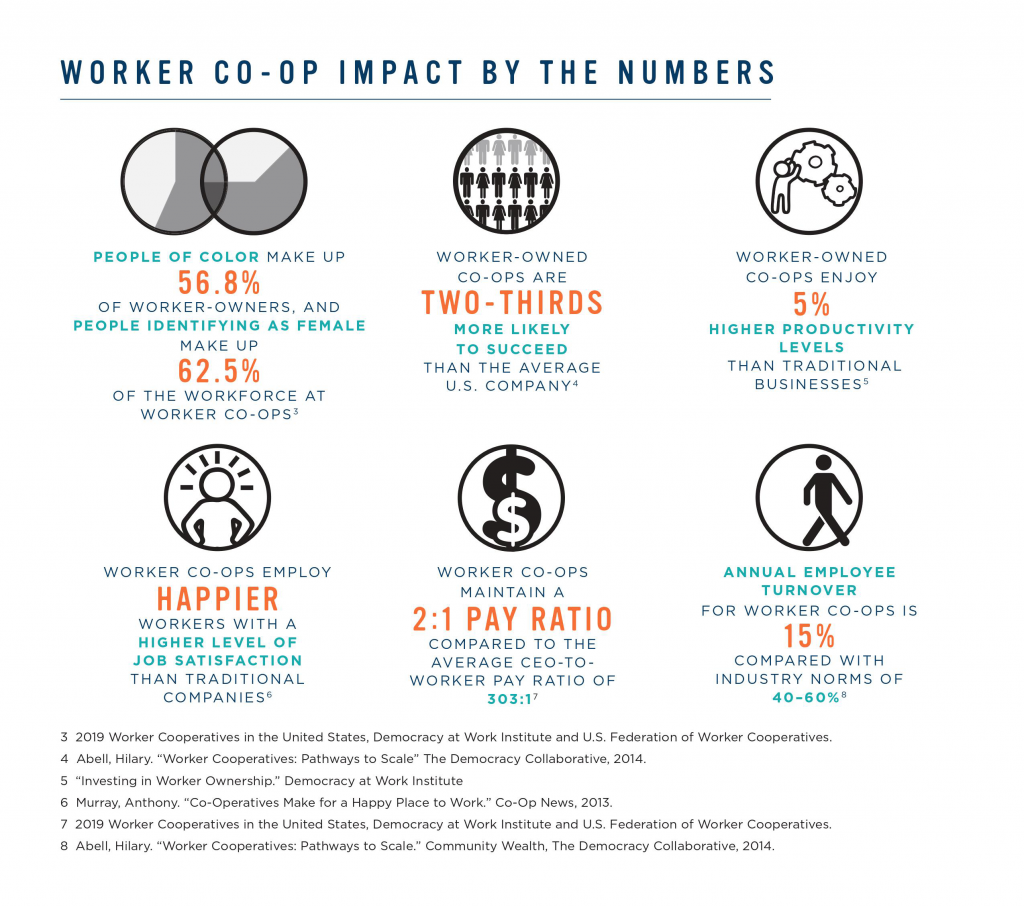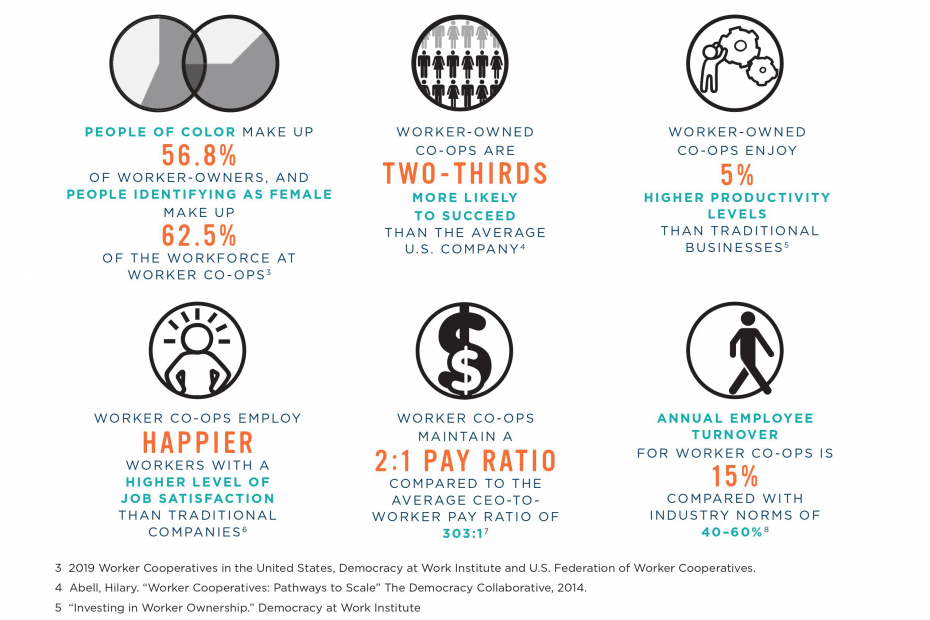A Cooperative and Inclusive Community
“Creating a worker co-op is not just creating a business; it is creating a community.”
– In Good Company: The Guide To Cooperative Employee Ownership
UPDATED 11/2/23. Artisans Cooperative is building an online handmade marketplace for an inclusive network of creatives: in other words, a co-op alternative to Etsy.
Although other start-ups have tried, artisans (artists, makers, crafters, illustrators, designers, and more) had only one natural place to sell their handmade goods online: Etsy. But Etsy has taken some major mis-steps lately, resulting in a lot of frustrated and disgruntled artisans and customers.
Customers complain there are too many non-handmade sellers on the platform, with one user calling the handmade filter “utterly broken.” Artisans have protested punitive rating systems, poor service, increased fees, and withholding of payments. It has come to the point where artisans and their frustrated customers are actively searching for alternatives.

A Better Marketplace with a Cooperative Business Model
Our co-op marketplace is trying to create a solution to this problem with:
- a more trustworthy marketplace of authentically handmade goods
- simple, transparent fees
- better support for artisans
To determine exactly how to better support artisans and please customers, we conducted a Marketplace Priorities Poll in 2022. The poll results, policies and plans we’ve written since then describe the detailed priorities of our community.
We believe that the cooperative business model and values is the key to fulfilling those priorities and creating a better experience for artisans and customers alike.
Private- and investor-owned marketplaces are operated purely for owner profits. But a cooperative business is owned and managed by the people who love the service, not just the profits it brings. As a democratically-owned business, a cooperative also has the right to make decisions that put people and planet over profits.
The people who use it will design it to meet their needs: reliability, sustainability, longevity, fair fees, and more. By building the marketplace cooperatively, artisans and customers together can create the marketplace they both want: filled with unique, creative, and authentically-handmade goods.
All Handmade Welcome: Inclusive and Broad Scope
Other alternative marketplaces (which are all private- or investor-owned) have differentiated themselves by focusing on a specific niche: whether it’s geography, demographic, or shopping theme (such as New Zealand only, military spouses, or goth). This leaves artisans looking for alternatives out in the dust, and reduces the market available to the platform.
Since we intend for our cooperative model to set us apart, our marketplace is a big tent, welcoming and accessible for genuine artists of all kinds, all around the world. We will not specialize in any one niche, except “handmade.” Instead, we intend to have robust and transparent search capabilities and filters to shop by important features – including social criteria.
We want our marketplace to evolve to meet the priorities of our artisans and supporters, wherever that takes us. As a project led by creatives, there are fresh ideas to explore, whether it’s unique approaches to shopping navigation, a better custom commissions system, or different trade options, such as barters and “pay what you want.”
Strength in Cooperation
“Co-operatives’ open membership model affords access to wealth creation and poverty elimination. … Because co-operatives are people-centred, not capital-centred, they do not perpetuate, nor accelerate capital concentration and they distribute wealth in a more fair way.
United Nations International Day of Cooperatives
The key to fulfilling this vision is in the democratic governance found in the cooperative business model:
- Democratic Ownership and Control. A cooperative is a democratically-managed marketplace owned by its members with a principle of “one member, one vote.” Members can run for, and elect leaders, submit proposals, and control major changes. This means members have democratic control over what fees are charged and what “handmade” means.
- Economic Participation. Member-owners equitably share in the value created by the cooperative as a whole. That means that a profitable year for the cooperative is a profitable year for all. This is done through a system of “patronage distributions,” which are monetary income like dividends. These distributions have the potential to become a second source of income for artisans if the cooperative is successful.
- Cooperative Values: A Caring Community. All cooperatives worldwide agree to operate by a set of seven values that put people over profits. Because of this, history and research has shown cooperatives to be more resilient and adaptable than traditional businesses over time. This is precisely because they are managed for their members’ needs as a group of people. Education and support for its members are one of the core values. In other words: the cooperative supports its members and its members support the cooperative.

By combining our collective strengths, we can create a self-reliant source of income for ourselves. Our cooperative marketplace has a unique advantage. Many of us, its artisan members, already have savvy, successful artisan businesses.
We have already been selling online, on Etsy, Instagram, our own websites and more, for years. We already have social media followers and customer lists of people who care about buying genuinely handmade. By sharing our news at the same time, together, we can have an outsized marketing footprint, right away. We all get a slice of the pie, and together, there will be a bigger pie to slice from.
Tried and Tested Business Model
There is nothing radically new in a cooperative online marketplace concept, and that should give us comfort. Artisans have always been the first founders of cooperatives, since the very beginnings in the 1700’s. The cooperative business model has been challenged, tried and tested for over 150 years.
One of the seven principles is cooperatives helping cooperatives. Accordingly, there are ample organizations and resources to help cooperatives get started. There are local, regional, rural-specific, national, and even international cooperative associations. There is even a special name for online cooperatives, and a dedicated organization for it: “platform co-ops.”
We already know there is shopper demand for a handmade artisan marketplace, thanks to Etsy’s success. Etsy’s monopoly in this space proves the need for competition. And the 80,000 Etsy Strike petition signers (including 30,000 Etsy shops) prove the interest in a better alternative.
We are artisans: we are creative and ambitious, self-reliant and independent. And it is time we had a marketplace of our own, a friendly space for ourselves and our community: our supportive customers, fans, and partners.
MORE RESOURCES / FURTHER READING:
- For All the People: Uncovering the Hidden History of Cooperation, Cooperative Movements, and Communalism in America by John Curl
- In Good Company: The Guide To Cooperative Employee Ownership
- The United Nations International Day of Cooperatives
About Artisans Cooperative
We are growing an online handmade marketplace for an inclusive network of creatives: a co-op alternative to Etsy.
Shop the marketplace!

Pingback: Artisans Cooperative: Building a Handmade Alternative to Etsy | the official blog of Walnut Studiolo
Pingback: Etsy Alternatives You Can Try Right Now (2022) | Artisans Cooperative
Pingback: We're Building A Co-op Marketplace For Artisans Online | Artisans Cooperative
Pingback: 3 Easy Ways To Shop “Actually Handmade” | Artisans Cooperative
Pingback: Get Involved: Volunteers Needed | Artisans Cooperative
Pingback: Platform Cooperativism: A “Bill Of Rights” For Artisans Selling Online | Artisans Cooperative
Pingback: Reimagining marketplace platforms
Pingback: Our First Annual Report | Artisans Cooperative
Pingback: What Resources Are Available for Troubleshooting Pottery Problems? – ClayCanvass